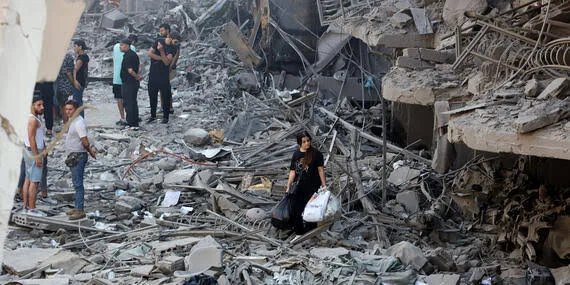Jerusalem/Beirut – July 10, 2025 – By;Tony Wild
The Israel-Hamas conflict has entered a new phase of intense escalation, with Israeli military operations intensifying in both northern Gaza and southern Lebanon. This heightened activity, coupled with a targeted Israeli drone strike that killed a Hezbollah commander near Tripoli, Lebanon, has raised alarm across the region and among international observers, threatening to further destabilize an already volatile Middle East.
Intensified Operations in Gaza and Southern Lebanon
The Israeli military (IDF) has reported extensive operations in northern Gaza, particularly in areas like Beit Hanoun, where forces are working to dismantle Hamas infrastructure and combat regrouping militants. Over the past day, the IDF stated it struck more than 100 “terror targets” across Gaza, including booby-trapped structures, weapons storage facilities, anti-tank missile launch posts, and tunnels. Reports indicate that soldiers have engaged with and killed militants, and located and dismantled caches of explosive devices. These operations come as talks for a ceasefire in Gaza remain fraught with major disagreements.
Concurrently, Israel has expanded its “special, targeted operations” into southern Lebanon, with the military confirming ground incursions aimed at preventing Hezbollah from re-establishing itself in key areas. These operations, described by the IDF as dismantling Hezbollah infrastructure and targeting its fighters, represent a significant breach of the November 2024 ceasefire agreement between Israel and Hezbollah, which sought to end a year of cross-border hostilities. The Lebanese army has warned that Israel’s continued aggression threatens Lebanon’s stability and negatively impacts regional security.
Hezbollah Commander Killed in Drone Strike Near Tripoli
In a development that further inflamed tensions, an Israeli drone strike on Tuesday near the northern Lebanese city of Tripoli killed Hussein Ali Muzhir, identified by the IDF as a Hezbollah commander involved in directing rocket attacks against Israel as part of Hezbollah’s Badr Unit. Lebanon’s Ministry of Health reported at least three fatalities and 13 injuries from the strike on a vehicle in the Ayrounieh area.
This strike, occurring more than 180 kilometers from the Israeli border, underscores Israel’s expanding operational reach within Lebanon and signals a clear intent to target Hezbollah leadership across the country. While Israel asserts these strikes are against Hezbollah arms depots and fighters, Lebanese authorities and international bodies have reported numerous civilian casualties and the destruction of residential buildings.

Regional and International Reactions
The escalating violence has drawn widespread concern. The Lebanese government has repeatedly called on the U.S. and international community to pressure Israel to cease its attacks and abide by the existing truce. Hezbollah, for its part, has reiterated that it will not disarm or back down from confronting Israel until it ends its air raids and fully withdraws from southern Lebanon.
Internationally, there are growing calls for de-escalation. The United Nations Secretary-General Antonio Guterres has consistently urged “maximum restraint” to avoid a “descent into deeper conflict,” and the UN Security Council has held emergency sessions on the broader Israel-Iran conflict that has seen direct attacks between the two countries this year. Concerns are particularly high regarding any military action that could jeopardize the safety of nuclear facilities in Iran, which have reportedly been targeted in earlier Israeli and U.S. strikes.
Many nations, including close U.S. allies, have urged a return to diplomacy, emphasizing that the current military adventurism by all sides is putting the Middle East in an “alarmingly dangerous situation.” The escalating conflict is also seen as a significant setback to any prospects of normalized relations between Israel and other countries in the region, with public perceptions of Israeli military campaigns contributing to widespread opposition to such normalization.
The coming days are critical. With tensions at an all-time high and a significant humanitarian crisis ongoing in Gaza, the risk of a wider regional conflagration stemming from these intensified conflicts is a grave concern for governments and populations across the globe.
